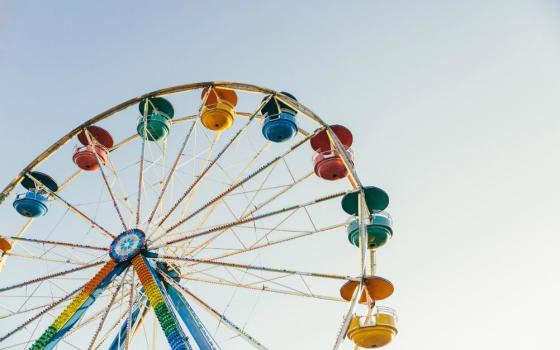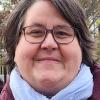Lately, it's felt a bit like each of us is playing the part of Bill Murray in the movie "Groundhog Day," doomed to repeat the same day over and over. We wake up each morning to the same depressing news … extreme weather and natural disasters, waves of migrant families desperately seeking refuge, politicians attacking one another rather than focusing on critical issues, and yes, yet another mass shooting. It's like a never-ending loop, one that repeats itself so much that we become numb to the life-altering realities, let alone that we are able to examine and address the root causes at the core of each day's negative news cycle.
Until it hits home.
Just hours after I read some of the first news reports of the Borderline Bar & Grill shooting in Thousand Oaks, California, I received a text from my oldest sister. Her oldest daughter was dancing at the Borderline that night.
All of a sudden the never-ending loop ended. This was real.
As I reflected that night on my personal blog: "my heart stopped. what if? I closed my eyes, said a prayer, and went back to reading the text. She and the friends she was dancing with escaped with their lives after the first shots were fired. They have since discovered that at least one high school friend is among those killed." In all, 12 people were killed by the shooter that night. Twelve families have had to live into that heart-stopping "what if?"
I thank God that my niece escaped with her life that night. I am grateful yet saddened that an entire generation has been trained how to escape when an active shooter opens fire. In this case, I think it saved my niece's life. She and her friends dropped to the floor and crawled and dragged each other out to safety.
I am left to ponder, how do we, as a society, crawl and drag each other out to safety? How do we resist the numbing effect of the never-ending cycle? How do we wake each other up and remember what really matters? How do we claim our citizenship and address the root causes of these life-and-death issues — like gun violence, climate change, racism and mass migration?
After all, we are one human family. We are not immune to the suffering. It will one day hit home for all of us.
In the days since my heart stopped, I have found myself returning to some of my own reflections on Global Sisters Report.
After the 2016 election: "It is a time for us to re-member, to bring the broken parts of our body politic back together, to heal traumatic divisions and nurse our civic discourse back to healthy levels. We need all hands on deck if we are to right the ship of our democracy."
After the Parkland, Florida, shooting: "I can't help but look to the example of the survivors of the shooting at Marjory Stoneman Douglas High School, organizing fellow students around the country to advocate for an end to the structures that allow mass shootings to persist in our nation."
After we began separating families at the border: "This is a soul-searching moment. We need to find our way to the right side of history. We need to challenge unjust and inhumane actions by our government. We need to find our way from fear to courage, to see the humanity in those human persons we have decided to treat as the undeserving 'other.'"
The events repeating daily on the news cycle are not isolated incidents. They are the consequences of our national policies, our uncivil discourse, our inability to read and respond to the signs of the times. We may not directly cause the suffering, but by our collective action and inaction, we are at best bystanders.
In his 1966 book, Conjectures of a Guilty Bystander, Thomas Merton reflected on the state of the world of that time. I can only imagine what he would make of our current reality.
We are living in the greatest revolution in history — a huge spontaneous upheaval of the entire human race: not the revolution planned and carried out by any particular party, race, or nation, but a deep elemental boiling over of all the inner contradictions that have ever been in [the human person], a revelation of the chaotic forces inside everybody. … This revolution is a profound spiritual crisis of the whole world, manifested largely in desperation, cynicism, violence, conflict, self-contradiction ambivalence, fear and hope, doubt and belief, creation and destructiveness, progress and regression, obsessive attachments to images, idols, slogans, programs that only dull the general anguish for a moment until it bursts out everywhere in a still more acute and terrifying form.
Sound familiar? And what to do? I believe we must act. Yes, we must hold our elected officials accountable and demand just and humane policies. But that is not enough. We must also tend the wounded nature of our collective soul. Person to person, we need to counter desperation and cynicism with hope and possibility and respond to violence and conflict with nonviolence and love, again and again. We stop the never-ending cycle with never-ending love.
It is not a coincidence that Merton also shares his famous mystical Fourth and Walnut experience in Conjectures:
In Louisville, at the corner of Fourth and Walnut, in the center of the shopping district, I was suddenly overwhelmed with the realization that I loved all those people, that they were mine and I theirs, that we could not be alien to one another even though we were total strangers. It was like waking from a dream of separateness, of spurious self-isolation in a special world, the world of renunciation and supposed holiness. The whole illusion of a separate holy existence is a dream.
Let's wake each other up, ok?
[Susan Rose Francois is a member of the Congregation Leadership Team for the Sisters of St. Joseph of Peace. She was a Bernardin scholar at Catholic Theological Union and has ministered as a justice educator and advocate. Read more of her work on her blog, At the Corner of Susan and St. Joseph.]

